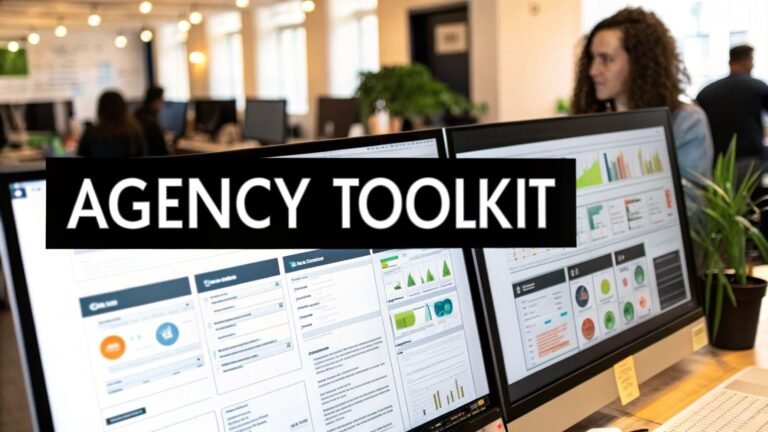Juggling client projects, deadlines, and team resources is the core challenge for any modern agency. The right software isn't just a task list; it's a central command center for collaboration, profitability, and client satisfaction. Yet, with so many options, choosing the perfect fit can feel overwhelming. Many generic tools lack the specific features agencies need, like client portals, billable hour tracking, and complex approval workflows.
This guide cuts through the noise. We provide an in-depth, honest comparison of the top 12 agency project management tools, focusing on the features that truly matter for delivering exceptional work on time and on budget. For teams operating outside a traditional office, understanding the specific needs of distributed collaboration is key. Before diving into our detailed list, it’s helpful to get an overview of platforms built for this model; you can explore a curated list of 10 Remote Project Management Tools designed to boost productivity for hybrid and fully remote teams.
Here, you will find a detailed breakdown of each platform, complete with screenshots, direct links, and practical use cases. From all-in-one solutions like Teamwork.com and monday.com to more specialized software, you'll get the insights needed to select a tool that empowers your team and streamlines your entire operation.
1. Teamwork.com
Teamwork.com stands out as one of the best agency project management tools because it was built specifically for managing client work. Unlike general-purpose tools, it deeply integrates project tasks with financial tracking, eliminating the need for multiple subscriptions. Agencies can manage projects, track time, monitor budgets, and even handle invoicing from a single, unified platform.
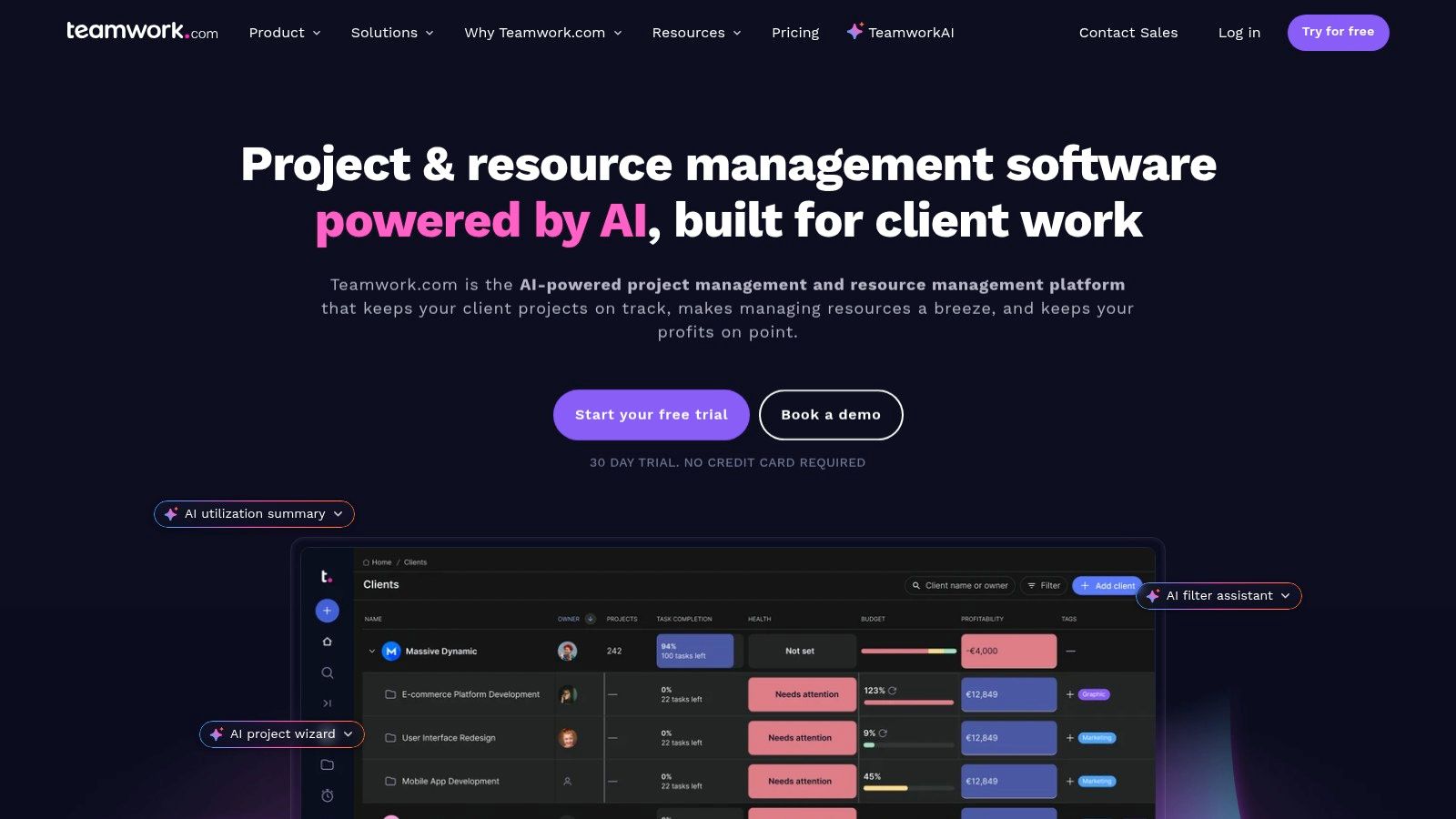
This focus on client-centric operations is its key differentiator. The platform allows unlimited free client users, which simplifies collaboration and approval workflows significantly. You can grant clients access to specific tasks, files, and progress reports, enhancing transparency and building trust without inflating your costs.
Key Features & Pricing
- Ideal For: Marketing, creative, and professional services agencies focused on profitability and client collaboration.
- Standout Feature: Integrated time tracking and budgeting tools that provide real-time profitability reports, comparing planned hours and costs against actuals.
- Pros: Purpose-built for agency workflows, includes unlimited client access on paid plans, and offers a generous 30-day free trial.
- Cons: Paid plans start with a user minimum (3 users), and some advanced features like resource scheduling are only available in higher-tier plans.
- Pricing: Paid plans start at $5.99 per user/month.
Website: https://www.teamwork.com
2. monday.com
monday.com positions itself as a "Work OS," offering a highly visual and flexible platform that agencies can mold to their specific workflows. Its strength lies in its intuitive, color-coded interface and extensive template library, which simplifies planning everything from marketing campaigns to complex client projects. This makes it one of the most adaptable agency project management tools for teams that value customization.
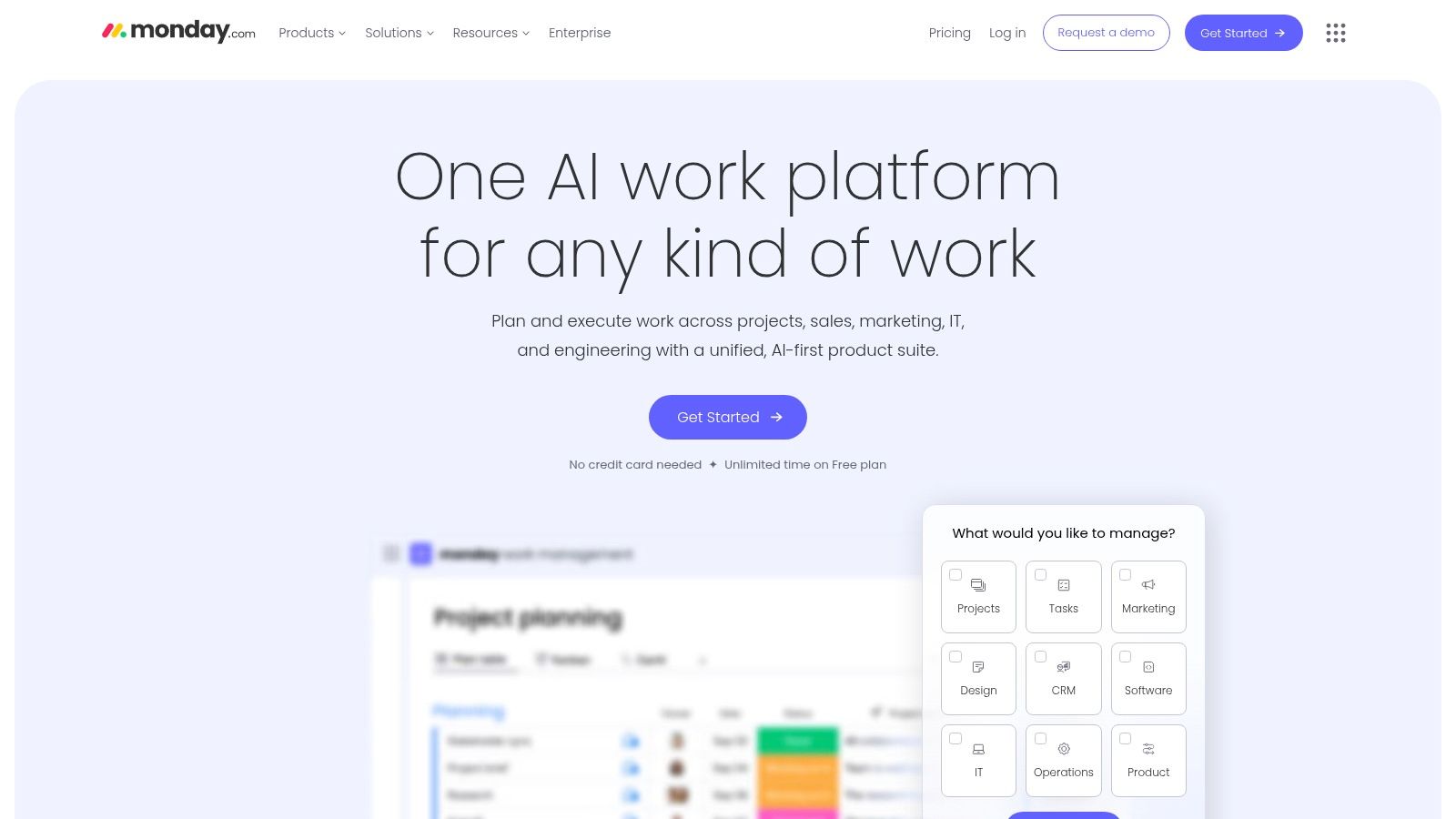
Unlike more rigid systems, monday.com allows you to build custom dashboards and automated workflows without needing technical expertise. For agencies that use multiple tools, its integration capabilities are crucial. For instance, teams that use both platforms will find that learning how to embed monday.com boards in Jira can significantly streamline cross-team collaboration, connecting high-level project planning with development tasks.
Key Features & Pricing
- Ideal For: Creative and marketing agencies that require a visually intuitive platform with powerful customization and automation.
- Standout Feature: A vast library of over 200 templates and customizable dashboards that allow teams to visualize project data with various views like Gantt, Kanban, and Calendar.
- Pros: Highly flexible with an easy onboarding process, and its strong mobile apps and ecosystem enhance usability on the go.
- Cons: Paid plans require a 3-seat minimum, and the number of automation and integration actions is capped per plan, which can be limiting.
- Pricing: Paid plans start at $9 per user/month.
Website: https://monday.com
3. Asana
Asana is a highly versatile work management platform that excels in managing creative and marketing agency workflows. It combines task management with powerful planning features, allowing teams to visualize project timelines, automate routine processes with its Workflow Builder, and streamline client intake using customizable Forms. Its clean interface and flexibility make it a popular choice for agencies of all sizes.
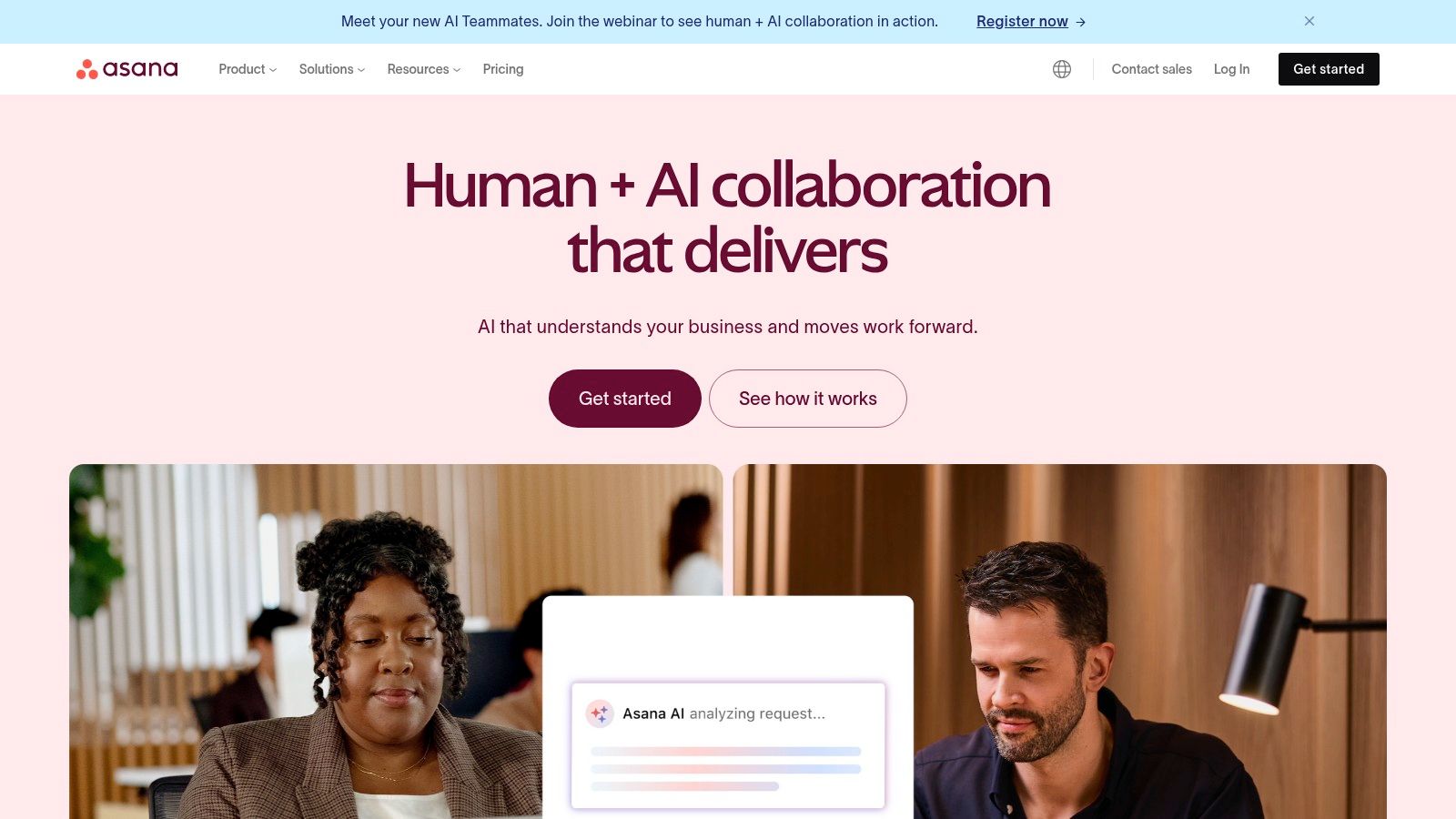
What sets Asana apart is its scalability and focus on cross-functional visibility. The Portfolios and Goals features, available in higher tiers, give agency leaders a high-level view of all projects, helping to track progress against strategic objectives. This makes it one of the best agency project management tools for organizations looking to align daily tasks with long-term business goals and manage resource allocation effectively.
Key Features & Pricing
- Ideal For: Creative and marketing agencies that need a flexible tool to manage everything from simple task lists to complex, multi-stage campaigns.
- Standout Feature: The Timeline view, which functions as an intuitive Gantt chart, allows teams to map out project dependencies and adjust schedules with a simple drag-and-drop interface.
- Pros: Excellent pre-built templates, extensive integrations with tools like Slack and Adobe Creative Cloud, and unlimited free guest access for client collaboration.
- Cons: Key agency features like workload management and approvals are locked behind more expensive plans, and per-user pricing can become costly for larger teams.
- Pricing: Paid plans start at $10.99 per user/month.
Website: https://asana.com
4. ClickUp
ClickUp positions itself as the "one app to replace them all," and for many agencies, it lives up to that promise. Its strength lies in its incredible customizability and the sheer breadth of features packed into a single platform, consolidating everything from tasks and docs to whiteboards and goal tracking. This makes it an excellent choice for agencies looking to reduce their tool stack and centralize workflows.
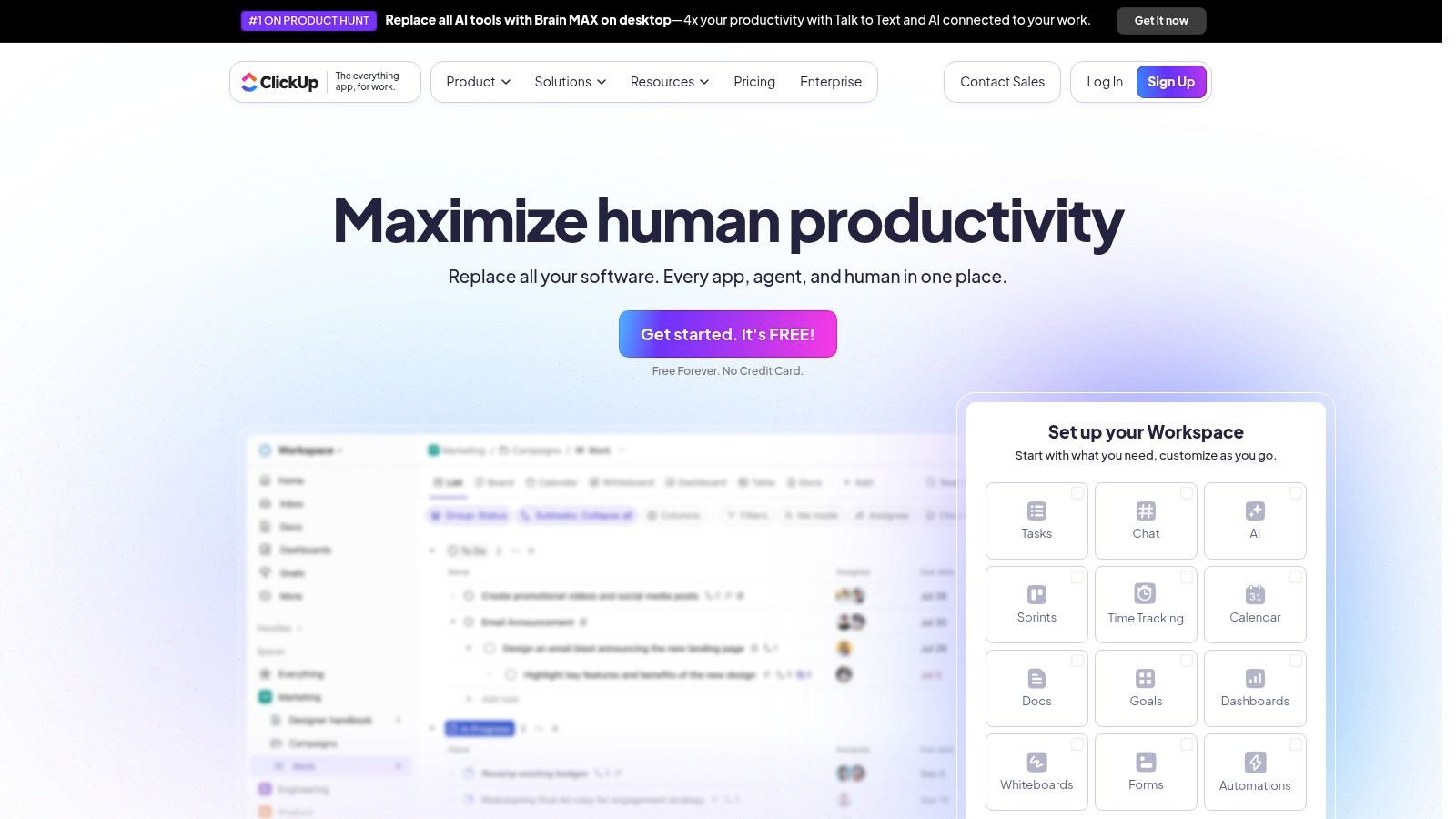
Unlike more specialized tools, ClickUp's flexibility allows you to build completely custom agency processes, from client onboarding to campaign execution. With a powerful hierarchy (Spaces > Folders > Lists > Tasks), you can structure work precisely how your team operates. As one of the most feature-rich agency project management tools available at its price point, it offers immense value for teams willing to invest time in setup.
Key Features & Pricing
- Ideal For: Tech-savvy agencies that need a highly customizable, all-in-one solution to manage diverse client projects and internal operations.
- Standout Feature: The platform’s extreme flexibility, allowing you to create custom views (List, Board, Calendar, Gantt, Whiteboard) for any project, catering to different team members' preferences.
- Pros: Highly competitive pricing for its vast feature set, and it effectively consolidates the need for separate apps like docs, chat, and goal trackers.
- Cons: The learning curve can be steep due to the number of features, and recent policy changes around guest access may impact costs for client collaboration.
- Pricing: Paid plans start at $7 per user/month.
Website: https://clickup.com
5. Wrike
Wrike brings enterprise-grade power to agency project management, offering a highly customizable platform designed to handle complex workflows. Its strength lies in specialized features for creative and marketing teams, particularly its exceptional proofing and approval tools, which streamline feedback on images, videos, and other creative assets directly within the task. This makes it a go-to for agencies managing high volumes of creative deliverables.
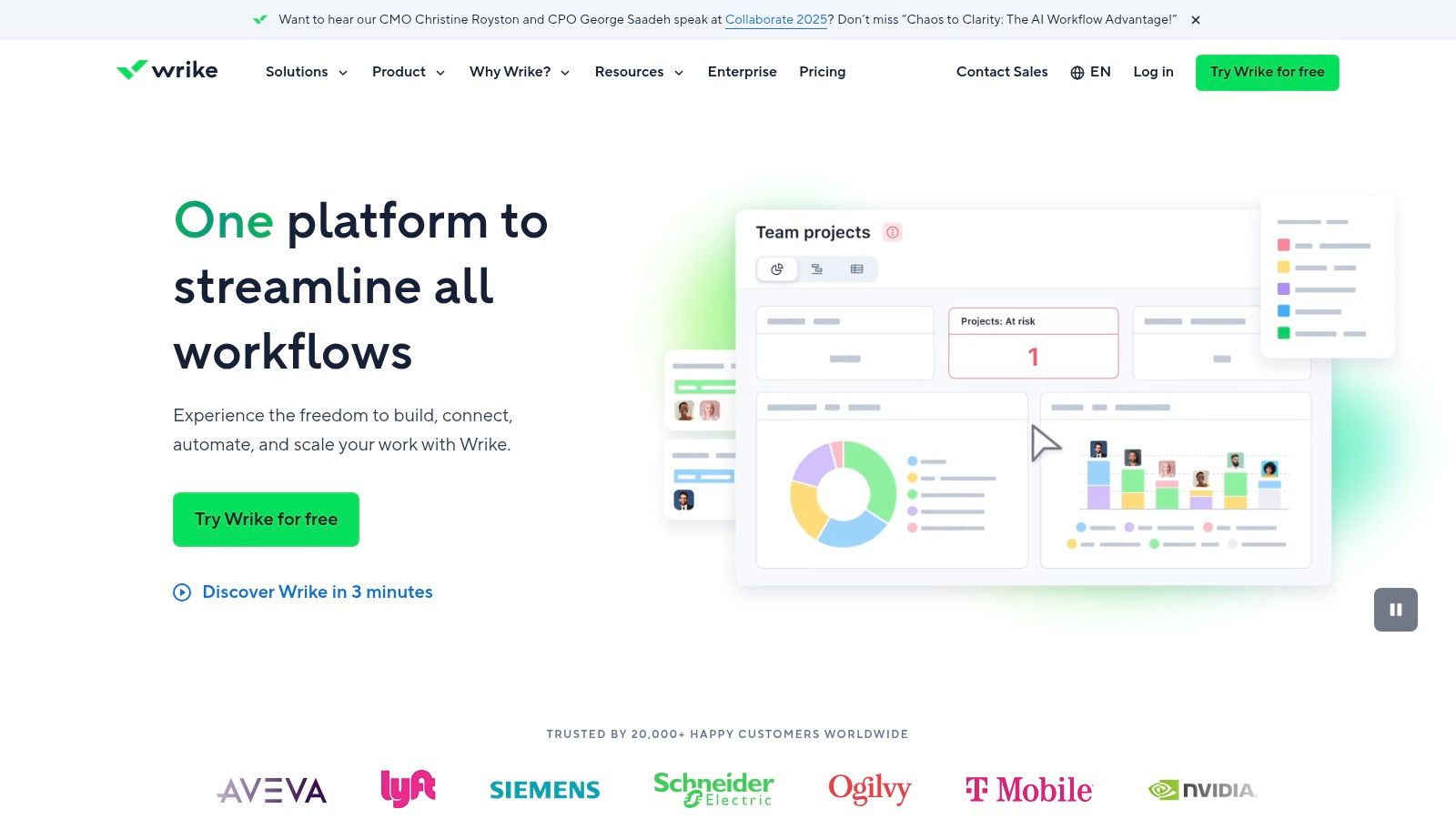
The platform’s dynamic request forms are another key differentiator, automating project intake and ensuring all necessary information is captured upfront. This structured approach helps organize chaos and integrates well with broader strategies, making it one of the more robust agency project management tools for scaling operations. For agencies looking to connect their project management with outreach, Wrike's structured workflows can complement your marketing automation efforts.
Key Features & Pricing
- Ideal For: Large agencies or marketing departments that need a powerful, scalable solution with advanced proofing and intake automation.
- Standout Feature: Built-in proofing and approval tools that allow precise, on-asset feedback for creative and web content, including a strong Adobe Creative Cloud integration.
- Pros: Tailored marketing and agency templates, highly scalable for teams of any size, and strong automation capabilities with dynamic request forms.
- Cons: Has a steep learning curve to leverage its full potential, and many of its best features are locked behind higher-priced Business or Enterprise plans.
- Pricing: Paid plans start at $9.80 per user/month.
Website: https://www.wrike.com
6. Smartsheet
Smartsheet leverages a familiar spreadsheet-style interface to offer a powerful and flexible work management platform. This approach makes it one of the most adaptable agency project management tools, especially for teams comfortable with grid-based planning that need to scale up with advanced features like Gantt charts, automated workflows, and real-time dashboards.
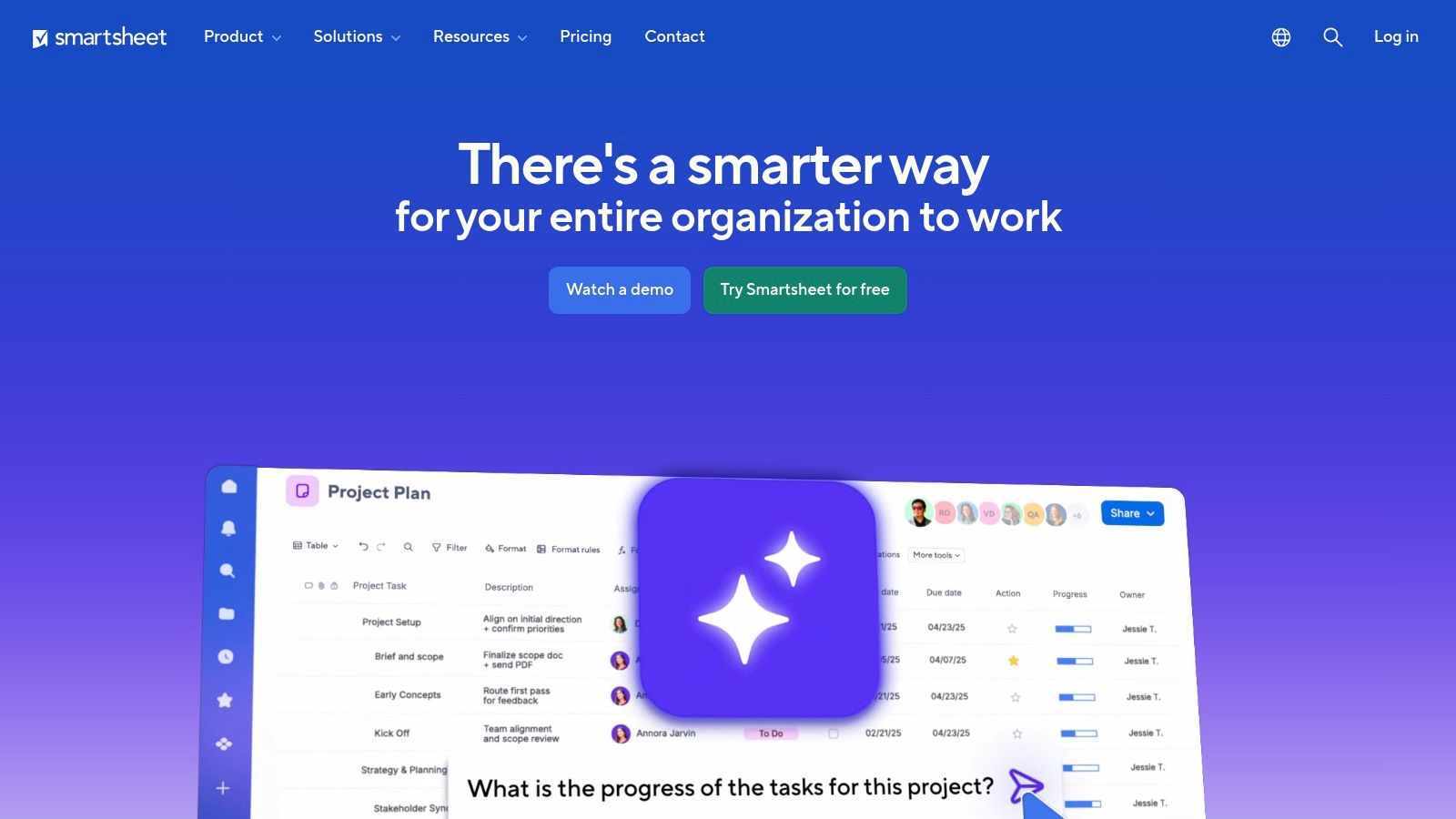
Its key differentiator is its enterprise-grade governance and security combined with a highly customizable foundation. Agencies can build everything from simple project trackers to complex, multi-project portfolio dashboards without writing a single line of code. The extensive automation capabilities on Business and Enterprise plans allow teams to streamline repetitive tasks like approval requests, status updates, and notifications, freeing up time for client-facing work.
Key Features & Pricing
- Ideal For: Large agencies or those within enterprise organizations that require robust security, governance, and extensive integration capabilities.
- Standout Feature: A powerful combination of grid, Gantt, card, and calendar views built upon a spreadsheet core, with unlimited automations available from the Business plan.
- Pros: Familiar spreadsheet interface reduces the learning curve, and it offers strong enterprise governance and robust guest/viewer models.
- Cons: Advanced portfolio and resource management features often require expensive add-ons, and the Pro plan is limited to just 10 users.
- Pricing: Paid plans start at $7 per user/month.
Website: https://www.smartsheet.com
7. Atlassian Jira Software (Cloud)
Atlassian Jira Software is a powerhouse for agencies handling technical projects, especially software development or complex IT rollouts. Its strength lies in highly customizable workflows and deep support for Agile methodologies like Scrum and Kanban. Unlike many general project management tools, Jira is built to handle intricate issue tracking, bug reporting, and development roadmaps with precision.
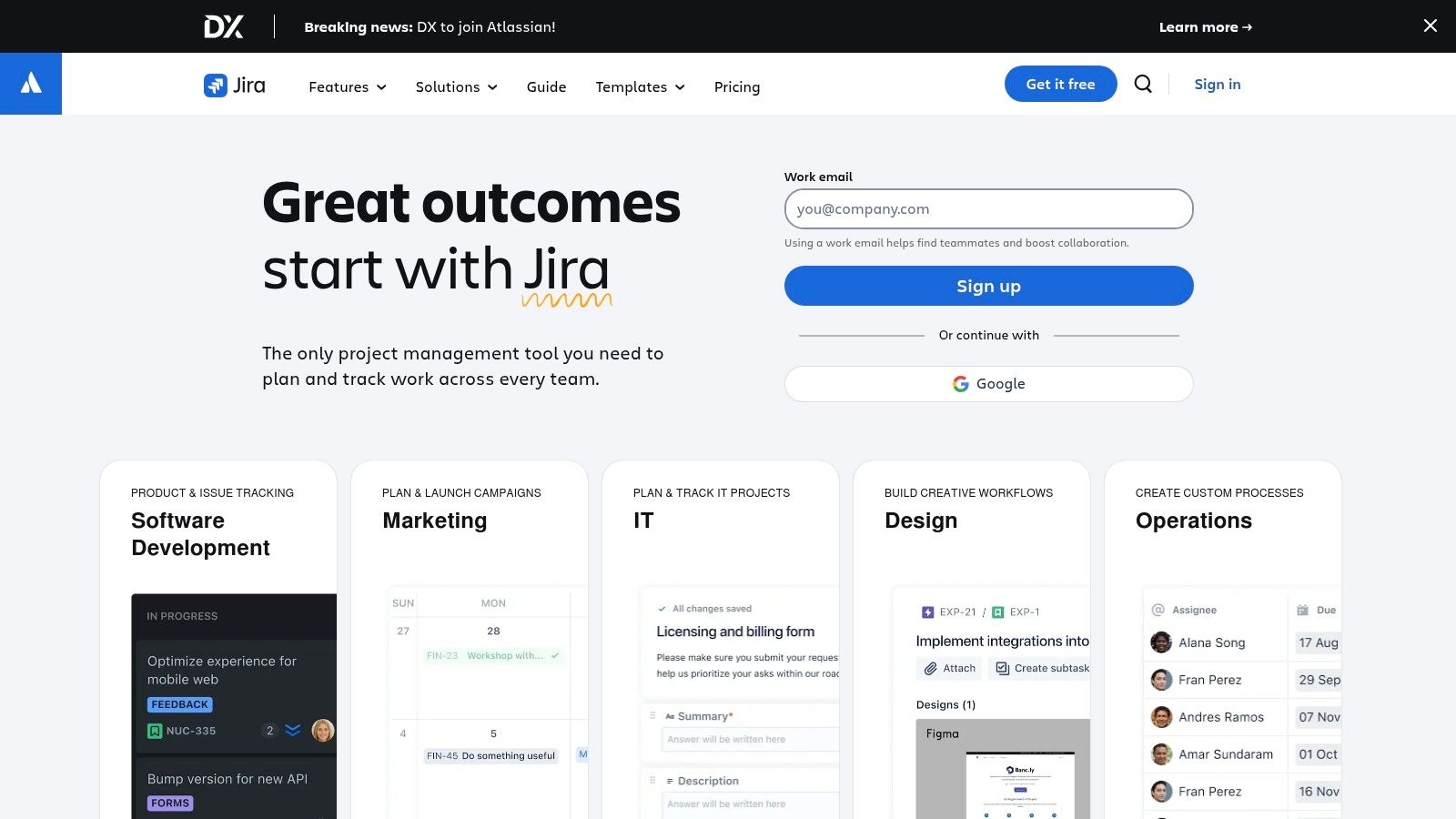
This makes it one of the best agency project management tools for development-focused teams that need robust processes. The platform’s ability to create custom fields, statuses, and automation rules allows agencies to tailor the system exactly to their service delivery model. With the inclusion of Jira Work Management, business teams like marketing and HR can also collaborate within the same ecosystem, though on a simpler interface.
Key Features & Pricing
- Ideal For: Technical, web development, and software agencies that manage projects using Agile frameworks.
- Standout Feature: Extremely customizable workflows combined with powerful Scrum and Kanban boards that support backlogs, sprints, and detailed reporting.
- Pros: Highly scalable for growing teams, offers deep workflow customization, and has a massive marketplace of third-party integrations.
- Cons: Can be overly complex for non-technical teams, and advanced security or administration features often require separate subscriptions.
- Pricing: Free for up to 10 users; paid plans start at $8.15 per user/month.
Website: https://www.atlassian.com/software/jira
8. Adobe Workfront
Adobe Workfront is an enterprise-grade work management platform designed for large marketing organizations and agencies that require deep integration with creative tools. Its strength lies in connecting complex marketing operations, from strategic planning and portfolio management to content creation and delivery, all within the Adobe ecosystem. This makes it a powerful choice for teams heavily reliant on Adobe Creative Cloud and Experience Cloud.
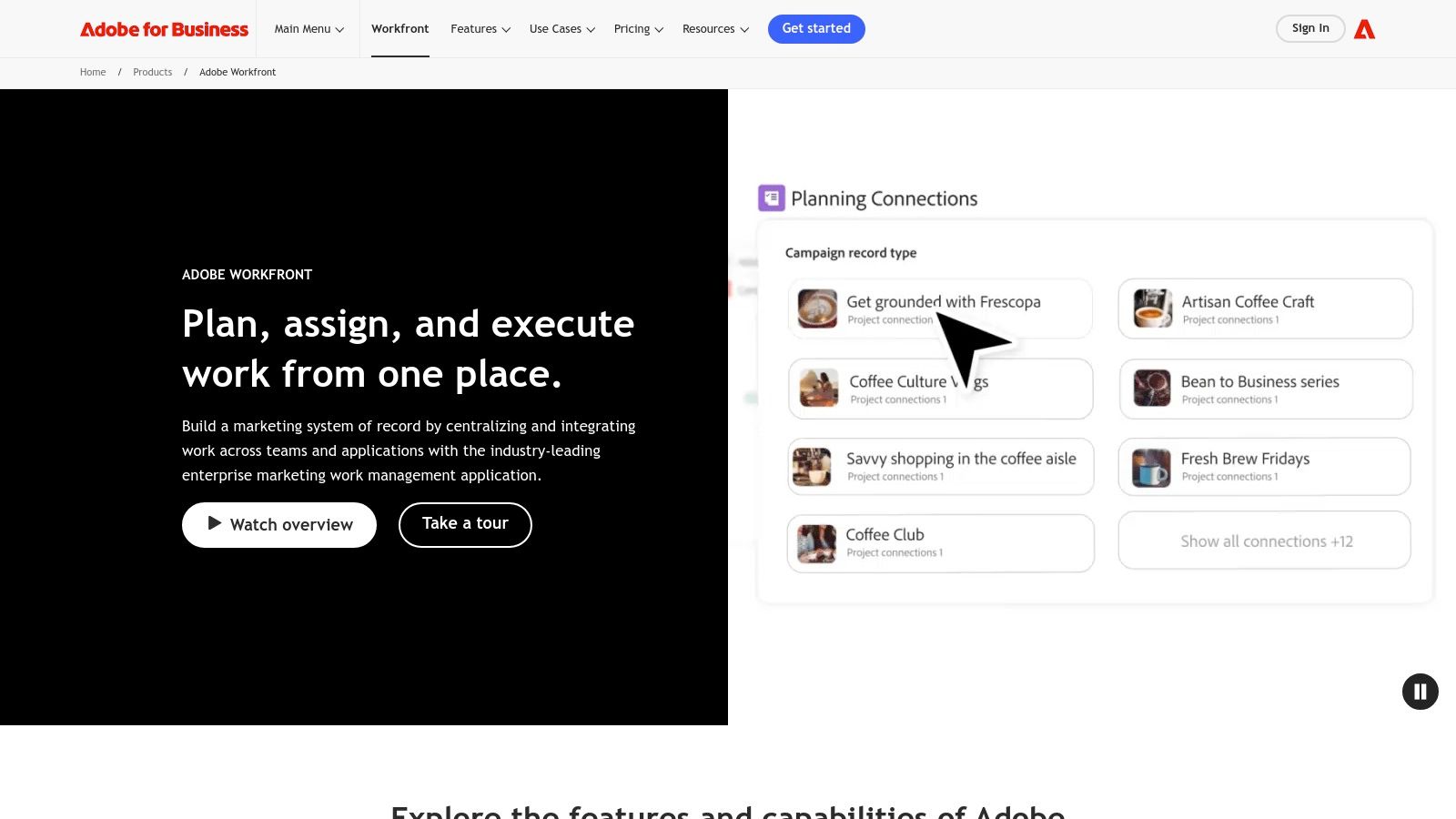
Unlike more general agency project management tools, Workfront focuses on streamlining the entire content lifecycle with robust approval workflows and resource management. It provides a single source of truth for high-volume creative production, ensuring compliance and operational visibility across large, distributed teams. The platform centralizes project requests, prioritizes work against strategic goals, and automates processes for maximum efficiency.
Key Features & Pricing
- Ideal For: Enterprise-level marketing departments and large agencies managing complex, high-volume creative and content workflows.
- Standout Feature: Seamless, native integrations with Adobe Creative Cloud and Experience Cloud, allowing creatives to work in their preferred apps while providing managers full visibility.
- Pros: Excellent for organizations needing enterprise-level security and compliance, and offers powerful portfolio and program management.
- Cons: Pricing is not public and requires a sales-led process, making it inaccessible for smaller teams. Its complexity can create a steep learning curve.
- Pricing: Custom enterprise pricing available upon request.
Website: https://business.adobe.com/products/workfront.html
9. Scoro
Scoro is a comprehensive, end-to-end work management solution designed for professional services and creative agencies. It goes beyond typical agency project management tools by unifying project management with CRM, quoting, billing, and detailed financial reporting. This all-in-one approach helps agencies manage their entire workflow from the initial client pitch to the final invoice, providing a single source of truth for business operations.
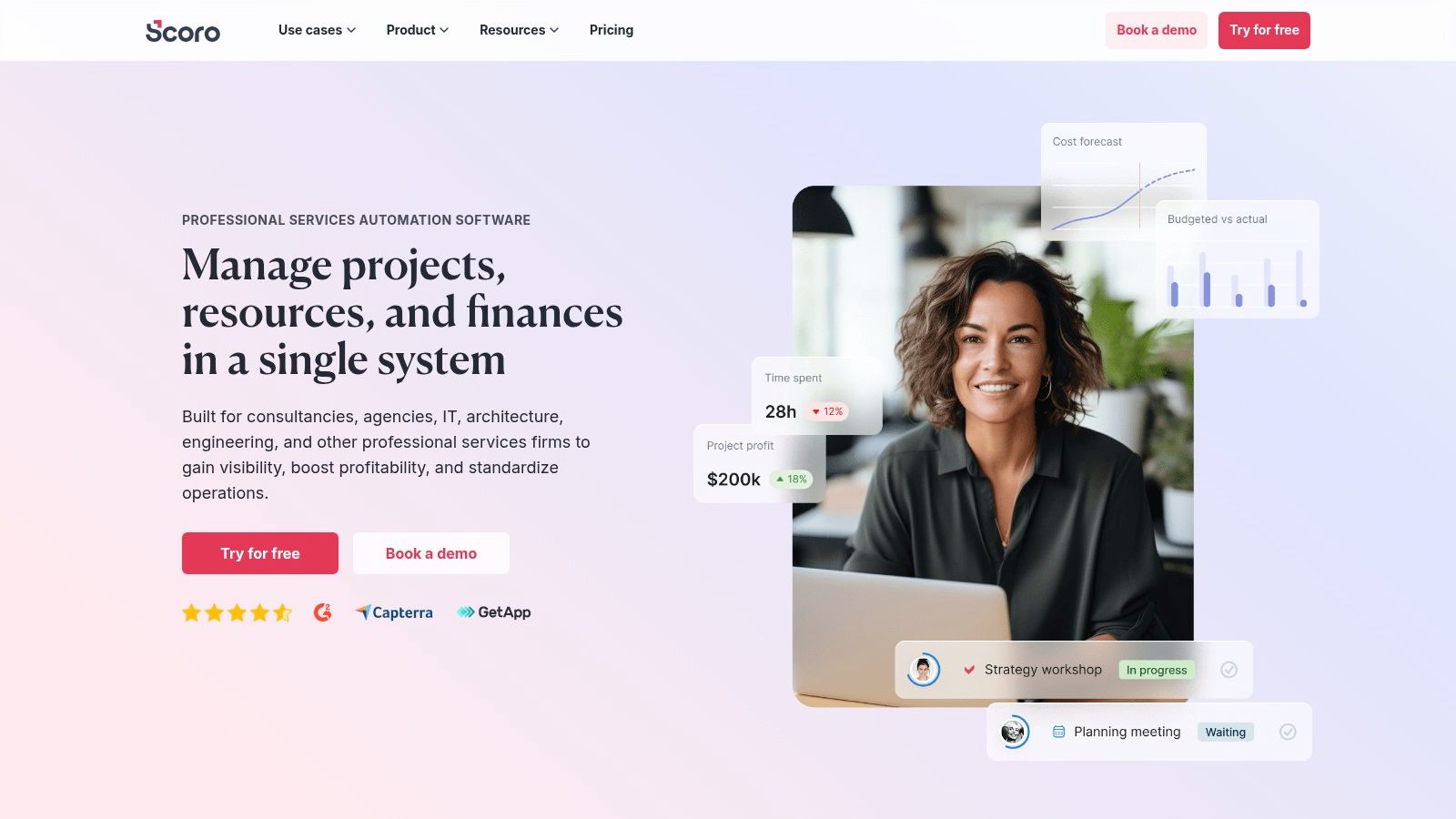
The platform's strength lies in its powerful financial capabilities, allowing agencies to track profitability in real time. You can compare quoted budgets against actual results, manage retainers, and use role-based labor costs for precise financial forecasting. For agencies looking to manage more than just tasks and timelines, Scoro offers a complete operational backbone, including valuable features for sales pipeline management software.
Key Features & Pricing
- Ideal For: Agencies that need a single platform to manage projects, clients, finances, and reporting without juggling multiple tools.
- Standout Feature: Integrated financial management that includes quoting, invoicing, retainer management, and real-time profitability tracking on a per-project basis.
- Pros: Combines project management, CRM, and financial tools into one system, and offers continuous product development with AI enhancements.
- Cons: Requires a minimum of 5 users, and the initial setup of advanced financial features can be time-consuming.
- Pricing: Contact Scoro for a custom quote.
Website: https://www.scoro.com
10. Zoho Projects
Zoho Projects is a powerful, budget-friendly contender among agency project management tools, especially for teams already invested in the Zoho ecosystem. It delivers a comprehensive suite of features, including task management, time tracking, and workflow automation, without the premium price tag of many competitors. Its ability to manage projects from start to finish makes it a solid choice for cost-conscious agencies.
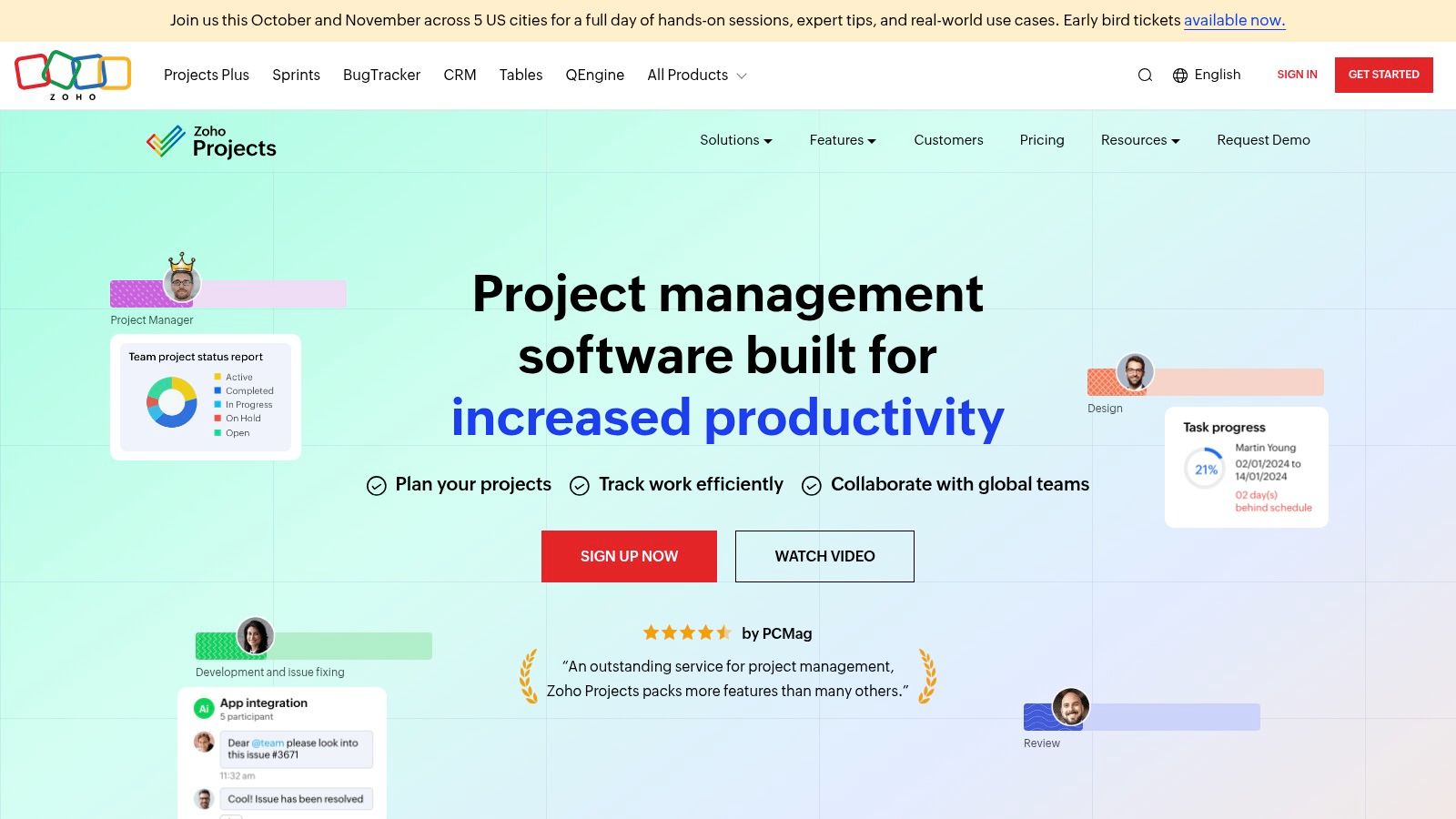
The platform's key differentiator is its Blueprint feature, which allows agencies to build and automate their standard operating procedures. This ensures every project follows a consistent, optimized workflow, reducing manual oversight and errors. Coupled with its seamless integration with other Zoho apps like Zoho CRM and Books, it creates a unified operational hub. For more insights on this integration, you can explore some customer relationship management basics.
Key Features & Pricing
- Ideal For: Agencies seeking an affordable, all-in-one solution that integrates deeply with other business management software.
- Standout Feature: Blueprint workflow automation that standardizes project processes and ensures quality control across all client work.
- Pros: Excellent value for its feature set, broad integration within the Zoho ecosystem, and flexible billing options with a free plan and trial.
- Cons: The interface can feel less polished compared to more modern competitors, and some pricing details are not transparent until you sign in.
- Pricing: Paid plans start at $4 per user/month (billed annually).
Website: https://www.zoho.com/projects
11. G2 — Project Management Software Category
While not a tool itself, G2’s Project Management category is an essential research hub for agencies evaluating their options. It acts as a massive software marketplace, compiling verified user reviews, detailed feature comparisons, and real-time rankings. For an agency, this resource is invaluable for shortlisting potential agency project management tools based on genuine user sentiment rather than just marketing claims.
Its key differentiator is the ability to filter and compare vendors based on company size, so you can see which platforms are most popular among SMBs, mid-market companies, or large enterprises. This helps agencies find solutions that are not only well-regarded but also a good fit for their specific scale and operational complexity, saving significant time during the research phase.
Key Features & Pricing
- Ideal For: Agencies in the initial research and comparison phase of selecting a new project management tool.
- Standout Feature: The G2 Grid and comparison tool, which lets you visually compare multiple software options side-by-side based on user satisfaction and market presence.
- Pros: Provides up-to-date buyer feedback and broad coverage of vendors, great for identifying leaders in specific market segments.
- Cons: Sponsored listings can sometimes influence visibility; always verify details directly on vendor websites.
- Pricing: Free to use for research and comparison.
Website: https://www.g2.com/categories/project-management
12. Capterra — Project Management Software Directory
While not a project management tool itself, Capterra is an indispensable resource for finding the right one. It's a comprehensive software directory where agencies can compare hundreds of agency project management tools side-by-side. Instead of signing up for dozens of free trials, you can use its powerful filters to narrow down options based on specific needs like client portals, time tracking, or budget management.
The platform's key value lies in its aggregated user reviews and detailed feature comparisons. This allows you to quickly gauge real-world performance and see how different tools stack up against each other without relying solely on marketing materials. The organized layout makes it easy to create a shortlist of top contenders, saving significant research time. For a similar comparative approach, you can learn more about how to choose the right platform on b2bemailverifier.com.
Key Features & Pricing
- Ideal For: Agencies in the initial research phase looking to efficiently evaluate and compare a wide range of project management software.
- Standout Feature: Extensive filtering system that allows you to sort by specific features, pricing models, user ratings, and deployment options to find a perfect match.
- Pros: Aggregates real user reviews and pros/cons, offers direct side-by-side comparisons, and is completely free to use for research.
- Cons: Pricing and feature information can occasionally be outdated, so it's best to verify details directly on the vendor's website.
- Pricing: Free to use.
Website: https://www.capterra.com/project-management-software/
Top 12 Agency Project Management Tools Comparison
| Product | Core Features | User Experience & Quality | Value Proposition | Target Audience | Pricing & Plans |
|---|---|---|---|---|---|
| Teamwork.com | Time tracking, budgets, client users | Purpose-built for agencies | Scalable pricing, strong client focus | Marketing, creative agencies | Clear tiers, 30-day free trial |
| monday.com | Visual project views, automations | Easy onboarding, strong ecosystem | Flexible workflow templates | Cross-team workflows | Seat minimum, capped automations |
| Asana | Timeline, portfolios, advanced search | Extensive integrations | Scalable from small teams to orgs | Marketing & creative teams | Per-seat pricing |
| ClickUp | Docs, whiteboards, time tracking | Feature-rich, competitive pricing | All-in-one platform | Agencies needing customization | Changing guest policies |
| Wrike | Proofing, dynamic forms, AI | Enterprise-grade, scalable | Marketing focus, Adobe integrations | Agencies & large teams | Advanced features in upper tiers |
| Smartsheet | Spreadsheet-like, unlimited sheets | Familiar UI, enterprise security | Flexible with robust automations | Agencies wanting flexibility | Add-ons needed for advanced features |
| Atlassian Jira Cloud | Agile boards, powerful automation | Highly customizable workflows | Scalable with large integration market | Tech and dev teams | Complex, separate subscriptions |
| Adobe Workfront | Portfolio mgmt, Adobe integrations | Enterprise-level features | Comprehensive marketing ops solution | Large marketing orgs | Sales-based, not publicly priced |
| Scoro | PSA, budgeting, AI assistant | End-to-end ops management | Financial features in one platform | Professional services/agencies | Requires 5+ users minimum |
| Zoho Projects | Issue tracking, automation, AI | Cost-effective, broad integrations | Budget-friendly, flexible billing | Cost-conscious agencies | Some pricing hidden until sign-in |
| G2 | Rankings, reviews, comparison tools | Current user sentiment | Software discovery and evaluation | Agencies evaluating PM tools | Free access |
| Capterra | Pricing snapshots, filters, ratings | Easy navigation | Quick feature & price comparisons | Agencies shortlisting software | Free access |
Making Your Final Decision: Next Steps for Your Agency
Choosing the right platform from our list of top agency project management tools is more than just a software purchase. It's a strategic investment in your agency's efficiency, profitability, and ability to scale. We've explored a wide range of options, from the all-in-one financial and project hubs like Teamwork.com and Scoro to the visually intuitive and flexible powerhouses like monday.com and Asana. Each tool offers a unique approach to solving the complex challenges of agency life.
The key takeaway is that there is no single "best" tool for every agency. The ideal solution depends entirely on your specific operational DNA. A creative agency prioritizing visual campaign tracking will have different needs than a development agency that requires the robust bug-tracking and sprint planning capabilities found in Jira. Similarly, a large enterprise agency might gravitate toward the scalable, complex workflow management of Adobe Workfront, while a smaller, agile team could thrive with the customizable simplicity of ClickUp.
Your Action Plan for Selecting the Right Tool
Now, it's time to turn this information into a decision. Don't rush this process. A hasty choice can lead to wasted resources and frustrated teams. Follow these practical steps to ensure you select a tool that truly empowers your agency.
- Define Your Core Needs: Before you even start a free trial, gather your team leaders. Document your top 3-5 "must-have" features. Is it client-facing portals, granular time tracking, resource allocation, or complex reporting? Get this on paper first.
- Shortlist Your Top Contenders: Based on your core needs, select two or three tools from this list for a head-to-head comparison. For example, if your focus is on client profitability and billing, you might compare Teamwork.com, Scoro, and Wrike.
- Involve Your Team in a Pilot Program: Sign up for free trials and assign a small, real-world project to a pilot team. This is the most critical step. Let the people who will use the software daily test its usability, intuitiveness, and functionality. Their feedback is invaluable for ensuring successful adoption.
- Evaluate Integration and Scalability: Consider your existing tech stack. Does the new tool integrate seamlessly with your CRM, accounting software, and communication apps? Also, think about your agency's five-year plan. Will this tool grow with you, or will you need to switch again in a few years?
A Final Thought on Implementation
Remember, even the most powerful agency project management tools are only as effective as the processes they support. Implementation is your opportunity to refine your workflows and set new standards for communication and delivery. As you onboard your team, also consider the data that flows through your projects. Maintaining a clean and verified client contact list is crucial. Using a complementary service to ensure your emails are valid protects your sender reputation and guarantees that vital project updates and invoices always land in the right inbox.
By taking a thoughtful, team-centric approach, you can confidently select and implement a project management solution that becomes the central nervous system of your agency, driving clarity, collaboration, and client success for years to come.

